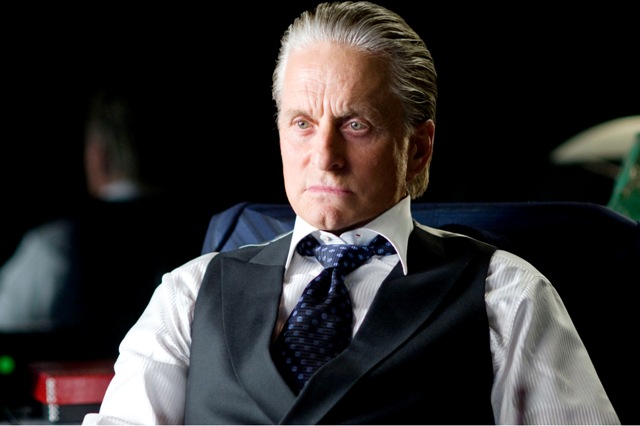CHICAGO – Patrick McDonald of HollywoodChicago.com appears on “The Morning Mess” with Dan Baker on WBGR-FM (Monroe, Wisconsin) on March 21st, 2024, reviewing the new streaming series “Manhunt” – based on the bestseller by James L. Swanson – currently streaming on Apple TV+.
Shia LaBeouf, Michael Douglas Drive Energetic ‘Wall Street: Money Never Sleeps’
 Rating: 4.0/5.0 |
CHICAGO – After a string of disappointments that include “Alexander,” “World Trade Center” and “W,” one of the best directors of the 1980s and 1990s at least draws closer to form with the entertaining “Wall Street: Money Never Sleeps”. The film is a great vehicle for Shia LaBeouf, Josh Brolin and Michael Douglas that occasionally disappoints but crackles more often than it fizzles.
The character of Gordon Gekko (Michael Douglas) returns in “Wall Street: Money Never Sleeps,” introduced on his way out of prison for his activities from the Oscar-winning first film, only to find no one there to pick him up. The man who helped define an era of greed by proclaiming it good has been left on his own. Where does a relic of the ’80s go from here?
It will take some time to find out as Stone’s film shifts gears and turns to the story of Jake Moore (Shia LaBeouf, doing the best work of his career), a loyal, smart young trader who works at a troubled firm headed by Louis Zabel (Frank Langella). As his mentor’s company collapses, Jake stays by his side, trying to weather the storm at a firm that would end up being the canary in the coal mine for the 2008 crisis that would soon impact all of Wall Street. Sadly, Zabel made a few too many questionable decisions and the mega-wealthy Bretton James (Josh Brolin) takes advantage of his weaknesses to takeover the companies for only a few dollars a share. Zabel is heartbroken and jumps in front of a train.

Wall Street: Money Never Sleeps
Photo credit: Barry Welcher/Fox
As Jake tries to piece together the professional and emotional elements of his life, he attends a book-selling event by Gekko himself and informs him that he plans to marry his daughter. Jake lives with and loves Winnie Gekko (Carey Mulligan, miscast), a charismatic young lady who never wants to speak to her father ever again. Moore is inspired by Gekko, a truly different kind of mentor, who it appears could help the young man get his revenge against the despicable James. Will he? Can Jake keep his new dynamic with his father-in-law secret from his future wife? Most importantly, can this (almost too) moral young man really swim in the same pool as Gordon Gekko and Bretton James?
I wish that Jake was a bit more deeply-flawed and not such a nearly-perfect, environmentally-conscious, loving, loyal hero and Winnie is too underwritten a character for an actress of Mulligan’s talents. She’s primarily a plot device and Carey looks uncomfortable in the role. The two-dimensionality of the central characters in “Wall Street: Money Never Sleeps” is a bit disappointing, but it’s balanced by a script with enough vibrant dialogue to overcome the lack of depth. It may be more surface-level a project than it could have been, but the surface is damn entertaining.
With “Wall Street: Money Never Sleeps,” Oliver Stone and writers Allan Loeb and Stephen Schiff have redefined the boundaries of Gekko’s classic line “Greed is good.” Even Gekko might be stunned at the actual behavior of his old stomping grounds in the ’00s. The fact is that the recent economic crisis made a sequel to “Wall Street” more of an update than a standard continuation. Times have changed and Stone seems reinvigorated by the opportunity to bring one of his former all-stars to the new game.

Wall Street: Money Never Sleeps
Photo credit: Barry Welcher/Fox
With adult-driven dialogue rarely seen in the multiplex — especially during the recently-passed summer season — excellent performances, intelligent plotting, and visual energy, “Wall Street: Money Never Sleeps” simply works. None of the fact-based action is dumbed-down and if you don’t know what subprime loans or moral hazard means, you might want to do some research about the 2008 financial crisis before checking out the entertainment version of a tale that essentially could be true.
Stone himself seems reinvigorated by a timely concept and a strong cast. Historically, his best work has been built from a foundation of truth (“Platoon,” “JFK,” “Natural Born Killers”) that comments on society and he clearly sees that in this project. Working with the great cinematographer Rodrigo Prieto (“Brokeback Mountain,” “Babel”), Stone and his team have crafted a film with copious personality. There are a few too many visual metaphors (dominoes falling, bubbles bursting, etc.) and a jaw-dropping shot of a ghostly Langella in a mirror could be the most embarrassing of the year, but there’s an energy to the filmmaking that Stone hasn’t had in years. And he draws great performances from LaBeouf, Brolin, Douglas, and Langella. Shia still looks young but he works in this film, balancing the purity of this character with the confidence and drive necessary to play with millions of dollars that’s not yours.
Sadly, “Wall Street: Money Never Sleeps” goes off the rails in a final scene that was a gigantic misstep by Stone and his writers. It’s an unearned, false epilogue to the story that simply doesn’t fit. It’s just not believable and could leave viewers completely dismissive of the entire project due to its radical left turn. Leave ten minutes before the end and you’ll have seen a nearly-great film.
 | By BRIAN TALLERICO |


